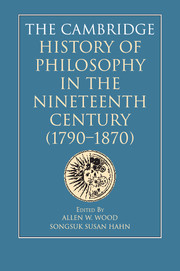Book contents
- Frontmatter
- Contents
- Contributors
- Preface
- Abbreviations
- Introduction
- I Philosophy in the Nineteenth Century
- 1 The Kantian Aftermath
- 2 The Social Conditions of Philosophy in the Nineteenth Century
- 3 The Unity of Reason and the Diversity of Life
- II Logic and Mathematics
- III Nature
- IV Mind, Language, and Culture
- V Ethics
- VI Religion
- VII Society
- VIII History
- References
- Index
- References
3 - The Unity of Reason and the Diversity of Life
The Idea of a System in Kant and in Nineteenth-Century Philosophy
from I - Philosophy in the Nineteenth Century
Published online by Cambridge University Press: 05 December 2012
- Frontmatter
- Contents
- Contributors
- Preface
- Abbreviations
- Introduction
- I Philosophy in the Nineteenth Century
- 1 The Kantian Aftermath
- 2 The Social Conditions of Philosophy in the Nineteenth Century
- 3 The Unity of Reason and the Diversity of Life
- II Logic and Mathematics
- III Nature
- IV Mind, Language, and Culture
- V Ethics
- VI Religion
- VII Society
- VIII History
- References
- Index
- References
Summary
INTRODUCTION
One of the most striking features of “continental” philosophy, and especially of the theories arising from German-speaking philosophy in the late eighteenth and most of the nineteenth century, consists in the fact that the concept of a ‘system’ plays a prominent role as a criterion for evaluating them. In almost no other age or context have the ideas of systematicity, systematic wholeness, and the form of a system been so bound up with the concept of philosophy itself. And this is true not only regarding positive evaluations but also negative ones. For some philosophers in this time the fulfillment of the criterion of systematicity was a direct and necessary condition for redeeming the claim to have provided a philosophical theory about something. Others, however, have seen the form of a system as an obstacle to any philosophical theory’s offering us any illuminating results whatever regarding any object at all.
That such controversial assessments could have arisen at all shows clearly all by itself that in this period there was a determinate spectrum of expectations regarding resorting to the concept of a system. This spectrum cannot be adequately accounted for if one is content to assume that the concept of a system, as in the eighteenth century Wolffian tradition, stands only for the idea of a certain methodical ordering of sentences (judgments, propositions) – thus for something like “being a science” (Wissenschaftlichkeit). In the late eighteenth and nineteenth centuries, the idea of a science was, to be sure, bound up with that of a system but did not exhaust it. We can see this if we attend to the fact that on the basis of a description of the interest in systematicity that relies on the concept of being scientific we cannot make sense of the fact that a conception of philosophy that does without the claim to systematicity does not automatically give up the claim to being scientific; nor on this basis can we understand how in this period the suspicion of systematicity could have arisen at all. In other words, we cannot in this way understand how a philosophy that is “only” scientific can be presented as a serious philosophical undertaking without making any claim to be systematic.
- Type
- Chapter
- Information
- Publisher: Cambridge University PressPrint publication year: 2012
References
- 1
- Cited by



